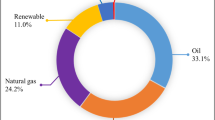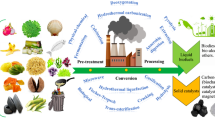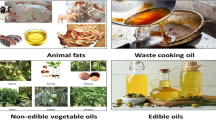Abstract
The presented study discusses biodiesel synthesis by utilizing two wastes: Mesua ferrea Linn (MFL) seed shells (inert support for developing catalysts) and used cooking oil (feedstock). The MFL shells were used for heterogeneous acid and base catalyst development through carbonization, steam activation and subsequent doping of H2SO4 or KOH, which upon instrumental examination showed effective doping of functional groups on the MFL char. The conversion approach uses methanol with sulfonated char (SC) for esterification, while the second stage utilizes 2-propanol for transesterification with KOH-doped char (KC) as a catalyst. Both stages optimize 5 controlling parameters such as mixing intensity, duration of reaction, catalyst load, alcohol concentration and reaction temperature in an L16 Taguchi experimental matrix. Thus, the obtained biodiesel has an ester content of 99.16%, while 97.35% of the free fatty acids (FFA) were converted, resulting in the product showing improved physico-chemical properties as assessed through fuel characterization tests. Reusability tests for the catalysts showed 4 reuses for acid catalyst compared to 9 reuses for base catalyst. Catalyst development costs were only $1.27/kg for activated char, while due to reuse, the prepared catalysts cost only $0.53/kg of biodiesel. Hence, the catalytic process holds great potential for commercialization if scaled up appropriately.








Similar content being viewed by others
References
Apita AO, Temu AK, Ntalikwa JW, Ogwok P (2010) Optimization of biodiesel production from Jatropha oil. Int J Eng Res Afr 3:62–73. https://doi.org/10.4028/www.scientific.net/JERA.3.62
Banani R, Youssef S, Bezzarga M, Abderrabba M (2015) Waste frying oil with high levels of free fatty acids as one of the prominent sources of biodiesel production. J Mater Env Sci 6(4):1178–1185 Available at: http://www.jmaterenvironsci.com
Baskar G, Naveenkumar R, Mohanapriya N, Roselin Nivetha S, Aiswarya R (2018) Optimization and kinetics of ultrasonic assisted biooil extraction from Madhuca indica seeds. Ind Crops Prod 124:954–959. https://doi.org/10.1016/j.indcrop.2018.08.081
Berrios M, Siles J, Martin MA, Martin A (2007) A kinetic study of the esterification of free fatty acids (FFA) in sunflower oil. Fuel 86(15):2383–2388. https://doi.org/10.1016/j.fuel.2007.02.002
Bobadilla MC, Lorza RL, García RE, Gómez FS, González EPV (2017) An improvement in biodiesel production from waste cooking oil by applying thought multi-response surface methodology using desirability functions. Energies 10:130. https://doi.org/10.3390/en10010130
Bokhari A, Chuah LF et al (2016) Optimisation on pretreament of rubber seed (Hevea brasiliensis) oil via esterification reaction in a hydrodynamic cavitation reactor. Biores Technol 199:414–422. https://doi.org/10.1016/j.biortech.2015.08.013
Bora AP, Dhawane SH, Anupam K, Halder G (2018) Biodiesel synthesis from Mesua ferrea oil using waste shell derived carbon catalyst. Renew Energy 121:195–204. https://doi.org/10.1016/j.renene.2018.01.036
Canakci M, Van Gerpen J (2001) Biodiesel production from oils and fats with high free fatty acids. Trans ASAE 44(6):1429–1436
Canoira L, Garcıa Galeán J, Alcántara R, Lapuerta M, Garcıa-Contreras R (2010) Fatty acid methyl esters (FAMEs) from castor oil: production process assessment and synergistic effects in its properties. Renew Energy 35(1):208–217
Changmai B, Vanlalveni C, Ingle AP, Bhagat R, Rokhum L (2020) Widely used catalysts in biodiesel production: a review. RSC Adv 10:41625. https://doi.org/10.1039/D0RA07931F
Charoenchaitrakool M, Thienmethangkoon J (2011) Statistical optimization for biodiesel production from waste frying oil through two-step catalyzed process. Fuel Proc Tech 92(1):112–118. https://doi.org/10.1016/j.fuproc.2010.09.012
Chongkhong S, Tongurai C, Chetpattananondh P, Bunyakan C (2007) Biodiesel production by esterification of palm fatty acid distillate. Biomass Bioenergy 31(8):563–568. https://doi.org/10.1016/j.biombioe.2007.03.001
Chua SY, A/P Periasamy L, Goh CMH, Tan YH, Mujawar MN, Kansedo J, Khalid M, Walvekar R, Abdullah EC (2019) Biodiesel synthesis using natural solid catalyst derived from biomass waste – a review. J Ind Eng Chem doi. https://doi.org/10.1016/j.jiec.2019.09.022
Demirbas A (2009) Progress and recent trends in biodiesel fuels. Energy Convers Manage 50:14–34. https://doi.org/10.1016/j.enconman.2008.09.001
Dhawane SH, Kumar T, Halder G (2016) Parametric effects and optimization on synthesis of iron (II) doped carbonaceous catalyst for the production of biodiesel. Energy Conv Manage 122:310–320. https://doi.org/10.1016/j.enconman.2016.06.005
Dhawane SH, Karmakar B, Ghosh S, Halder G (2018) Parametric optimization of biodiesel synthesis from waste cooking oil via Taguchi approach. J Env Chem Eng 6:3971–3980. https://doi.org/10.1016/j.jece.2018.05.053
Felizardo P, Correia MJN, Raposo I, Mendes JF, Berkemeier R, Bordado JM (2006) Production of biodiesel from waste frying oils. Waste Manage 26(5):487–494. https://doi.org/10.1016/j.wasman.2005.02.025
Ghadge SV, Raheman H (2005) Biodiesel production from mahua (Madhuca indica) oil high free fatty acids. Biomass Bioenergy 28:601–605
Goyal P, Sharma MP, Jain S (2012) Optimization of esterification and transesterification of high FFA Jatropha curcas oil using response surface methodology. J Petrol Sci Res 1(3):36–43
Halder S, Dhawane SH, Kumar T, Halder G (2015) Acid catalyzed esterification of castor (Ricinus communis) oil: optimization through a central composite design approach. Biofuels 6:191–201. https://doi.org/10.1080/17597269.2015.1078559
Hidayat A, Rochmadi WK, Budiman A (2015) Esterification of free fatty acid on palm fatty acid distillate using activated carbon catalysts generated from coconut shell. Proc Chem 16:365–371
Karmakar B, Halder G (2019) Progress and future of biodiesel synthesis: advancements in oil extraction and conversion technologies. Energy Convers Manage 182:307–339. https://doi.org/10.1016/j.enconman.2018.12.066
Karmakar B, Dhawane SH, Halder G (2018) Optimization of biodiesel production from castor oil by Taguchi design. J Env Chem Eng 6:2684–2695. https://doi.org/10.1016/j.jece.2018.04.019
Karmakar B, Ghosh B, Halder G (2020a) Sulfonated Mesua ferrea Linn seed shell catalyzed biodiesel synthesis from castor oil – response surface optimization. Front Energy Res 8:576792. https://doi.org/10.3389/fenrg.2020.576792
Karmakar B, Ghosh B, Samanta S, Halder G (2020b) Sulfonated catalytic esterification of Madhuca indica oil using waste Delonix regia: L16 Taguchi optimization and kinetics. Sustain Energy Tech Assess 37:100568. https://doi.org/10.1016/j.renene.2018.01.036
Karmakar B, Samanta S, Halder G (2020c) Delonix regia heterogeneous catalyzed two-step biodiesel production from Pongamia pinnata oil using methanol and 2-propanol. J Clean Prod 255:120313. https://doi.org/10.1016/j.jclepro.2020.120313
Karmakar B, Hossain A, Jha B, Sagar R, Halder G (2021) Factorial optimization of biodiesel synthesis from castor-karanja oil blend with methanol-isopropanol mixture through acid/base doped Delonix regia heterogeneous catalysis. Fuel 285:119197. https://doi.org/10.1016/j.fuel.2020.119197
Lopresto CG, Naccarato S, Albo L, De Paola MG, Chakraborty S, Curcio S, Calabro V (2015) Enzymatic transesterification of waste vegetable oil to produce biodiesel. Ecotoxicol Environ Saf 121:229–235. https://doi.org/10.1016/j.ecoenv.2015.03.028
Ma F, Hanna MA (1999) Biodiesel production: a review. Biores Tech 70:1–15. https://doi.org/10.1016/S0960-8524(99)00025-5
Medina-Valtierra J, Sanchez-Olmos LA, Carrasco-Marin F, Sanchez-Cardenas M (2017) Optimization models type box-behnken in the obtaining of biodiesel from waste frying oil using a large-acidity carbonaceous catalyst. Int J Chem React Eng. https://doi.org/10.1515/ijcre-2017-0072
Mukherjee A, Karmakar B, Halder G (2020) Response surface optimized free radical grafting of methyl methacrylate on de-lignified rice straw for evaluating its application potential as flame retardant roofing material. Chem Eng J Adv 1:100007. https://doi.org/10.1016/j.ceja.2020.100007
Neeharika TSVR, Bhimjiyani VH, Dole BR, Prasanna Rani KN, Karadbhajne VY, Prasad RBN (2017) Esterification of free fatty acids present in Jatropha oil: a kinetic study. Ind J Chem Tech 24:213–217
Olubunmi BE, Karmakar B, Aderemi OM, Akpan Uduak G, Auta M, Halder G (2020) Parametric optimization by Taguchi L9 approach towards biodiesel production from restaurant waste oil using Fe-supported anthill catalyst. J Env Chem Eng 8:104288. https://doi.org/10.1016/j.jece.2020.104288
Öner C, Altun Ş (2009) Biodiesel production from inedible animal tallow and an experimental investigation of its use as alternative fuel in a direct injection diesel Engine. Appl Energy 86(10):2114–2120
Patil PD, Deng S (2009) Optimization of biodiesel production from edible and non-edible vegetable oils. Fuel 88:1302–1306. https://doi.org/10.1016/j.fuel.2009.01.016
Raj FRMS, Sahayaraj JW (2010) A comparative study over alternative fuel (biodiesel) for environmental friendly emission. Proc Int Conf Rec Adv in Space Tech. Serv Clim Chan:80–86. https://doi.org/10.1109/RSTSCC.2010.5712805
Ramachandran K, Sivakumar P, Suganya T, Renganathan S (2011) Production of biodiesel from mixed waste vegetable oil using an aluminium hydrogen sulphate as a heterogeneous acid catalyst. Biores Technol 102:7289–7293. https://doi.org/10.1016/j.biortech.2011.04.100
Sahoo PK, Das LM (2009) Process optimization for biodiesel production from Jatropha, Karanja and Polanga oils. Fuel 88(9):1588–1594. https://doi.org/10.1016/j.fuel.2009.02.016
Sarno M, Iuliano M (2019) Biodiesel production from waste cooking oil. Green Proc. Synth. 8:828–836
Sharma YC, Singh B (2008) Development of biodiesel from karanja, a tree found in rural India. Fuel 87(8-9):1740–1742. https://doi.org/10.1016/j.fuel.2007.08.001
Show S, Karmakar B, Halder G (2020) Sorptive uptake of anti-inflammatory drug ibuprofen by waste biomass–derived biochar: experimental and statistical analysis. Biomass Conv Bioref. https://doi.org/10.1007/s13399-020-00922-8
Show S, Mukherjee S, Devi MS, Karmakar B, Halder G (2021) Linear and non-linear analysis of Ibuprofen riddance efficacy by Terminalia catappa active biochar: equilibrium, kinetics, safe disposal, reusability and cost estimation. Proc Saf Env Prot 147:942–964. https://doi.org/10.1016/j.psep.2021.01.024
Singh R, Padhi S (2009) Characterization of jatropha oil for the preparation of biodiesel. Nat Prod Radiance 8(2):127–132
Srivastava A, Prasad R (2000) Triglycerides-based diesel fuels. Renew Sustain Energy Rev 4(2):111–133. https://doi.org/10.1016/S1364-0321(99)00013-1
Sukumar P, Vedaraman N (2005) Mahua oil (Madhuca indica seed oil) methyl ester as biodiesel preparation and emission characteristics. Biomass Bioenergy 28(1):87–93. https://doi.org/10.1016/j.biombioe.2004.06.002
Veljkovic VB, Lakicevic SH, Stamenkovic OS, Todorovic ZB, Lazic ML (2006) Biodiesel production from tobacco (Nicotiana tabacum L.) seed oil with a high content of free fatty acids. United Kingdom. https://doi.org/10.1016/j.fuel.2006.04.015
Wan Omar WNN, Nordin N, Mohamed M, Amin NAS (2009) A two-step biodiesel production from waste cooking oil: optimization of pre-treatment step. J Appl Sci 9(17):3098–3103
Wang Y, Ou S, Liu P, Zhang Z (2007) Preparation of biodiesel from waste cooking oil via two-step catalyzed process. Energy Convers Manage 48(1):184–188. https://doi.org/10.1016/j.enconman.2006.04.016
Acknowledgements
The authors need to express their gratitude to Ms. Sucharita Samanta for her help in graphical interpretation of the results obtained. Sincere gratitude needs to the expressed to the Department of Chemical Engineering, National Institute of Technology, where the studies were carried out.
Availability of data and materials
All data generated or analysed during this study are included in this published article.
Funding
The authors would like to express their sincere gratitude to the Ministry of Science and Technology, Govt. of India, for their financial assistance through research project no. EEQ/2016/000243.
Author information
Authors and Affiliations
Contributions
B.K. conceptualized the study and listed necessary resources while also handling software-based experimental designing and formal analysis as well as data curation. He also wrote the original draft. S.M. and S.L.S. were the experimental investigators who also validated obtained data, while G.H. was the supervisor and was in charge of this project. He also took the responsibility of reviewing and editing the manuscript and handling submission related procedures. The final version of the manuscript was read and approved by all authors.
Corresponding author
Ethics declarations
Ethics approval and consent to participate
Not applicable.
Consent for publication
Not applicable.
Competing interests
The authors declare no competing interests.
Additional information
Responsible Editor: Ta Yeong Wu
Publisher’s note
Springer Nature remains neutral with regard to jurisdictional claims in published maps and institutional affiliations.
Supplementary Information
ESM 1
(DOCX 16 kb)
Rights and permissions
About this article
Cite this article
Karmakar, B., Mukherjee, S., Sengupta, S.L. et al. Recirculating used cooking oil and Nagkesar seed shells in dual-stage catalytic biodiesel synthesis with C1-C3 alcohols. Environ Sci Pollut Res 28, 58154–58169 (2021). https://doi.org/10.1007/s11356-021-14309-3
Received:
Accepted:
Published:
Issue Date:
DOI: https://doi.org/10.1007/s11356-021-14309-3




